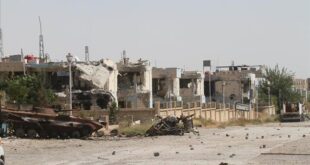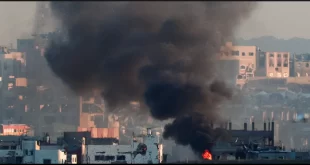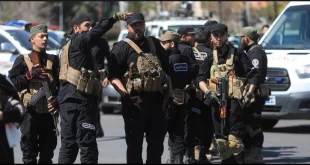May 26, 2014, the National
Last week, a prominent Arab archaeologist sent me a weblink to a doubly-depressing story from the Hasakeh region of north-east Syria. Bordering Turkey and Iraq, it’s long been one of the poorest areas in the country and now, with control of the area being contested by several of the factions engaged in Syria’s brutal civil war, its 1.7 million people, or those who haven’t already fled across the border, are among those most in need of humanitarian assistance.
Watered by the Khabur river, Hasakeh has seen the birth of some of the earliest civilisations in the region. Indeed, one site, Hamoukar, is considered by some archaeologists to be the oldest city in the world. Dozens of important sites, dating from the Stone Age onwards, have been identified, though few have yet been extensively studied.
There’s no scope for investigations now into what this region has to offer in terms of discovering the origins of agriculture and early urban society. Such studies require a peaceful environment – and that is absent.
The first depressing part of the story is that many sites are being severely damaged by illegal digging, searching for items that can be sold into the underground market for antiquities. Supplies of such artefacts grow dramatically in areas of conflict where the maintenance of law and order breaks down. Local inhabitants, desperate for income, plunder sites, destroying evidence of past civilisations in the search for goods they can sell on to unscrupulous dealers who then put them into the illicit market. Those dealers are often linked with gangs of thugs, thieves and bandits who are themselves to a considerable degree responsible for the level of insecurity that permits the unauthorised digging to take place.
In Hasakeh, such plundering is now apparently widespread. One site that is being affected is that of Tell Ajaja, an important centre during the neo-Assyrian period, around 3,000 years ago. Pictures surfacing on the internet, if authentic, indicate that a number of major discoveries have been made, including large statues and bas-reliefs. If properly excavated and studied, they could yield much valuable information on this early phase of Syrian history. Instead, that opportunity to gain knowledge is being lost.
And the second part of this depressing story? One of the videos recently posted on the internet shows some of the statues being smashed to rubble by gangs from the ultra-fundamentalist Islamic State of Iraq and the Levant (ISIL), one of the armed groups competing for supremacy in Hasakeh. Lacking in historical knowledge and indoctrinated by a perverted view of Islam, ISIL’s followers are either unaware that some of the great Islamic civilisations produced art of this type, and did so within the framework of a society where tolerance for the views of others was an essential part of life, or, perhaps more likely, they simply don’t care, glorying in their ignorance.
What lunacy is this? Although the representation of humans may be a controversial topic in some Islamic societies, these statues predate the coming of Islam by 1,500 years or more. They’re not in breach of anything, just like the great statues of Buddha from Bamiyan that were blown to pieces by the ignorant, uncultured Taliban. Instead, they represent important elements of the way in which civilisation has developed, not just since the early 7th century AD, when Islam was revealed, but for millennia before that.
I regret the plundering of Hasakeh’s ancient archaeological sites, because of the loss of knowledge that represents. I can, however, understand the economic imperatives that lead its people to destroy the evidence of their past to survive in a difficult present.
As for the actions of ISIL in reducing these important artefacts of the history of Hasakeh to rubble, I should, I suppose, not be too surprised. Many of the members of the ISIL gangs will be foreign extremists to whom the history of the area means nothing. They are led by evil men who think nothing of slaughtering the innocent just because they have a different set of beliefs, even within Islam.
They care nothing for culture, history or heritage, or even for the basic principles of humanity to be found in all of the world’s religions. They are little better than ignorant and ravening beasts – and many would argue that they are, in fact, much worse. How sad that Hasakeh, a cradle of civilisation, should today be a centre of their ignorance and inhumanity.
 Syria Support Movement solidarity with the Syrian people
Syria Support Movement solidarity with the Syrian people




